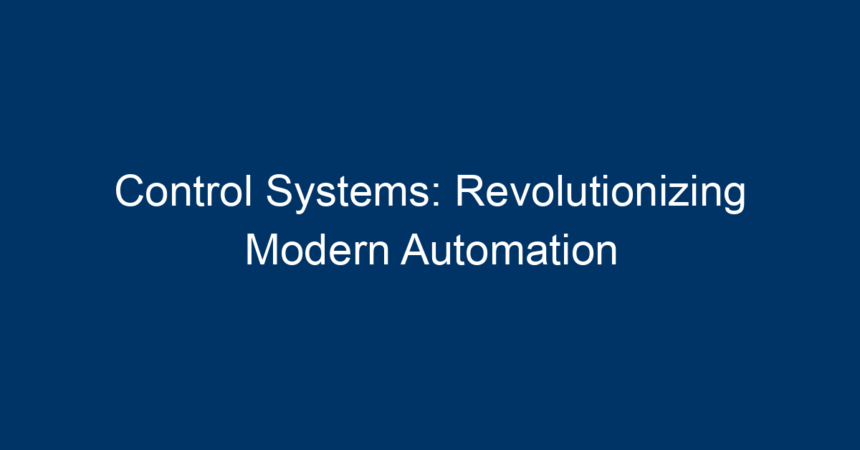In the landscape of modern engineering, control systems stand at the forefront of technological innovation, transforming industries and enabling a level of automation that was once unimaginable. From manufacturing to healthcare, the impact of control systems is ubiquitous, revolutionizing how we monitor, manage, and automate complex processes. This article delves deep into the essence of control systems, exploring their significance, types, applications, and future trends.
What Are Control Systems?
Control systems are essential components in the automation of processes, characterized by their ability to regulate the behavior of dynamic systems. At their core, control systems interpret data from sensors and execute commands to optimize performance, enhancing efficiency and accuracy.
The Components of Control Systems
-
Sensors: These devices gather real-time data from the environment, such as temperature, pressure, and flow rates, providing the necessary inputs for the control process.
-
Controllers: The brain of the control system, controllers analyze sensor data and execute predetermined control actions to achieve desired outputs. Common types include proportional-integral-derivative (PID) controllers, which fine-tune processes effectively.
-
Actuators: Acting upon commands from the controller, actuators physically manipulate the system – moving valves, adjusting motors, or changing speed settings.
- Feedback Mechanisms: Control systems utilize feedback loops, where the output is monitored and fed back into the system to ensure desired performance levels are maintained.
Types of Control Systems
Control systems can primarily be categorized into two types: open-loop and closed-loop systems.
Open-Loop Control Systems
In an open-loop system, the output is not monitored or adjusted based on feedback. The controller executes commands based solely on the initial input. An example is a washing machine set to run for a specific duration without sensing the actual cleanliness of the clothes.
Closed-Loop Control Systems
Closed-loop systems are more sophisticated, utilizing feedback to adjust outputs dynamically. This results in improved accuracy and stability. A classic example is a thermostat that regulates temperature by turning the heating or cooling system on or off based on real-time room temperature data.
Importance of Control Systems in Automation
Efficiency and Productivity
One of the most significant benefits of control systems is their ability to increase efficiency and productivity. By automating repetitive tasks and continuously monitoring processes, businesses can minimize human error and reduce operational costs. This is particularly evident in manufacturing environments, where control systems automate assembly lines, improving both speed and consistency.
Enhanced Precision
Control systems enable precise control over various parameters. In industries like aerospace and pharmaceuticals, even the slightest deviations can be detrimental. Control systems ensure tight tolerances and consistent quality, making them indispensable in high-stakes environments.
Safety and Reliability
By automating complex processes, control systems enhance workplace safety. For example, in chemical plants, control systems monitor levels of hazardous materials, preventing potential disasters. They also provide reliable solutions by maintaining consistent operations, which is crucial in sectors like energy production.
Applications of Control Systems
The versatility of control systems allows their application across diverse sectors:
Industrial Automation
In manufacturing, control systems streamline operations, from assembly lines to robotics. They allow for real-time adjustments, bolstering production capacity without compromising quality.
Healthcare
In healthcare, control systems are pivotal in managing medical devices. For instance, insulin pumps utilize control systems to deliver precise amounts of insulin based on blood glucose readings, significantly improving patient outcomes.
Transportation
Control systems enhance safety and reliability in transportation. Adaptive cruise control systems in vehicles adjust speed based on traffic conditions, while air traffic control systems utilize advanced algorithms to manage the complexity of flight paths.
Telecommunications
In telecommunications, control systems manage network traffic, ensuring data is transmitted efficiently and securely. This is particularly critical as the volume of data usage continues to grow exponentially.
Future Trends in Control Systems
As technology progresses, control systems will evolve, driven by several trends:
Integration with Artificial Intelligence
The integration of AI with control systems is set to revolutionize automation. Machine learning algorithms can analyze vast datasets, optimizing control actions with superior accuracy. This shift will enable predictive maintenance, where systems can anticipate failures before they occur, minimizing downtime.
IoT and Smart Control Systems
The Internet of Things (IoT) will further enhance the capabilities of control systems. With interconnected devices continuously relaying data, control systems can operate on a macro scale, managing entire ecosystems rather than individual devices.
Increased Focus on Cybersecurity
As control systems become more interconnected, the risk of cyber threats increases. Future developments will prioritize robust cybersecurity measures, ensuring that systems remain safe from potential attacks.
Conclusion: The Road Ahead for Control Systems
Control systems are undeniably transforming the way industries operate, offering unparalleled levels of automation, efficiency, and safety. As we look to the future, advancements in AI and IoT will drive further innovation in this field, making control systems more intelligent and versatile.
Actionable Insights
-
Stay Updated: As technology evolves, keeping abreast of the latest trends in control systems is crucial. Attend industry conferences, subscribe to relevant publications, and engage with professional networks.
-
Invest in Training: Ensure your team is well-versed in the latest control system technologies. Training can improve efficiency and reduce operational risks.
- Embrace Smart Solutions: Consider integrating IoT capabilities into your control systems. The future lies in smart automation, where systems can optimize performance in real time.
In summary, the transformative power of control systems in modern automation cannot be overstated. By embracing these technologies, businesses can not only enhance their operational efficiency but also position themselves to thrive in an increasingly automated future.




